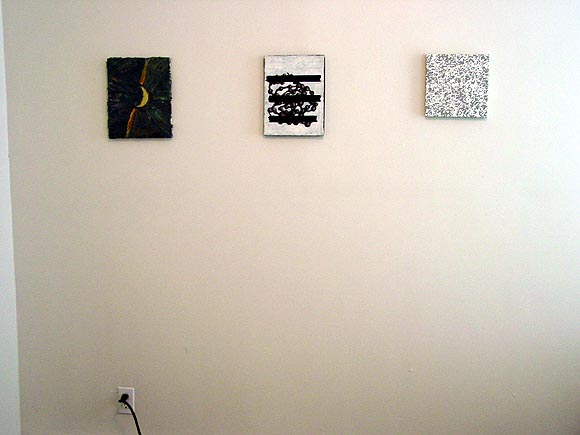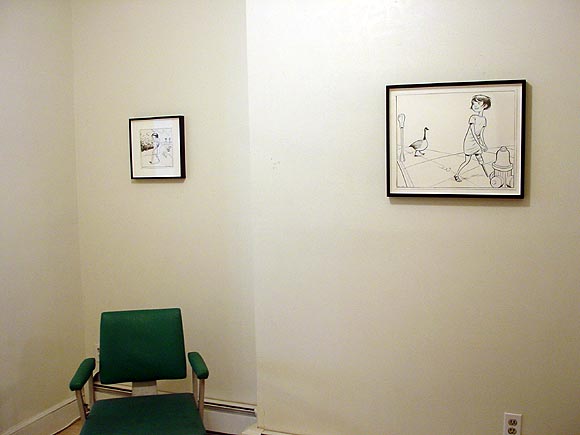View current page
...more recent posts
Just watched the trailer for A Scanner Darkly. It looks like an extended episode of Tom Goes to the Mayor. I'll see it out of loyalty to Phil Dick and the desire to hear his excellent words spoken by actors such as Robert Downey Jr. But there's a reason we had to wait twenty five years for a definitive Lord of the Rings--it took that long for the stink to clear from the '78 Ralph Bakshi version, which also showcased rotoscoped animation.
A fairly nuanced article from Cory Doctorow in support of "net neutrality" is here. He makes hash of the phone companies' beef that internet companies are getting to "use their pipes for free," but at the same time lists the difficulties in crafting neutrality legislation that doesn't stifle future innovation. Here's a good way of understanding what's at stake in the argument, and why you the consumer should care about the issue:
Why does network neutrality need protecting? Craigslist co-founder Craig Newmark addressed this point in an editorial he wrote for CNN.com: "Let's say you call Joe's Pizza, and the first thing you hear is a message saying you'll be connected in a minute or two, but if you want, you can be connected to Pizza Hut right away. That's not fair, right? You called Joe's and want some Joe's pizza."Make no mistake, our phone and cable companies are spending millions and working Capitol Hill to take away some of the freedom you currently enjoy with the Internet. They hate it and want you to subscribe to their shitty programming the way you do with cable TV. On the other hand:
The most prominent voices for net neutrality have been calling for a regulatory solution. Regulation created this mess, so maybe regulation can solve it. Congress can pass a law directing the FCC to adopt rules to ensure neutrality.Read the rest, it's interesting, if complicated. I don't think we can just throw up our hands and say "the big companies will take care of this." Citizen involvement--Net user involvement--is going to be needed at every stage of the process.
It's a plausible answer, but the devil is in the details. If we're going to come up with regulations to keep the phone companies in line, we'll need to be sure they do the job. That means:
* The regulation should only catch companies when the free market and competition fail to protect customers. The long-distance fiber market, for example, has proven to be quite amenable to competition, as has the local ISP business. The rule has to be for the last mile, and only the last mile, whether delivered by wires or wireless.
* The rules should keep the phone companies in check without screwing the next generation of network services. Overlay carriers like FON, who provide last-mile connectivity by piggy-backing on the carriers' networks, should be free to play around with business models. This is about protecting us from monopolies in the last mile, not locking them in as the only last mile we'll ever get. We want to leash the Bells, not new innovators.


Dado used the image of the TV static photos I did (with Ray Rapp) to accompany a blog post on the buzzing sounds and visual crackling we sometimes experience in sleep or near-sleep, and their relationship to the "three types of thought": perceptual, linguistic, and proprioceptive (involving body awareness). It's in French, so I'm relying on Google to translate it. I'm pleased to see the image getting out there. That work has not been shown, outside my studio, website, and the people who have linked to it. Or, put another way, it has been shown around the world but not seen in a physical, public space in New York.
A few weeks back I noted the similarity of our Pres to Paul Lazzaro, the character in Kurt Vonnegut's Slaughterhouse Five who lives for revenge (played by Ron Liebman in the movie). Lazzaro describes cruelly killing a dog who bit him once, biding his time and waiting for the right moment when the animal "least expects it." Eventually Lazzaro whacks the book's protagonist, Billy Pilgrim, as payback for some ancient slight. Bush offers nothing positive or constructive as a leader but excels at settling scores, Saddam being the most conspicuous "because he tried to kill my dad at one time." Recently blogger Elton Beard made the Lazzaro connection too, and even found a similarity in language used by George and Paul:
Q: Mr. President, what do you think of the successor to Zarqawi that was named by al Qaeda? ...THE PRESIDENT: I think the successor to Zarqawi is going to be on our list to bring to justice.Now, it's one thing to relinquish without fight a fragment of language like "begging the question" which is at least arguably only of interest to logicians. But if "to bring to justice" comes to be commonly understood as "to kill on my command" rather than as "to try before a duly constituted court" then it seems something crucial will have been lost.
* * * * * *
Speaking of killers - readers of Vonnegut will no doubt also appreciate Mr. Bush's fine impersonation of Paul Lazzaro from Schlachthof Funf:LAZZARO: You're on my list, pal.Paul Lazzaro lovingly maintained a list of people he disfavored and consequently planned to kill. He was, of course, quite insane.
David Lynch asks a WTC 7 related question (Quicktime). Go David!
Click it today* because it's his daily report and the question probably won't be up tomorrow.
*("Friday, June 23. Here in LA we have blue skies, golden sunshine...")
Update, Jun 26: Here's what he asked on Friday: "An interesting question for the blog page: Do you think all high rise buildings should be condemned? Because as was proven with for instance the WTC 7 building in New York, if a few floors catch on fire, the whole building falls down. Do you therefore think all high rise buildings should be condemned?"

"Piano Three Hands (Drums)" [mp3 removed]
I posted this tune a while back as an "acoustic piano" piece. [mp3 removed] A friend was nice to compare it to Conlon Nancarrow, who laboriously wrote music on real piano rolls to be played by real player pianos.
That's encouraging, but I'm not as atonal or obsessive as CN. I was actually imagining some kind of "dazzling" Keith Emerson/Wyndham Hill solo played without any emotional expression. The crowd-pleasing speed and key-modulating complexity without the ladled-on passion we expect from keyboard virtuosos.
Here, I took the same tune and added drums and changed the piano samples to more of a "house" sound. Now it could be a MIDI version of Yellow Magic Orchestra, or at the very least, not Nancarrow. The point here, if I have one, is that our associations of music depend largely on the instruments used rather than structure.
This one's more fun, I think.
